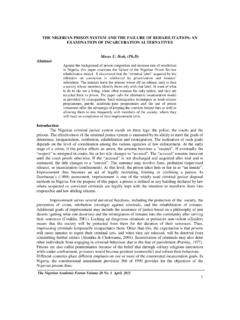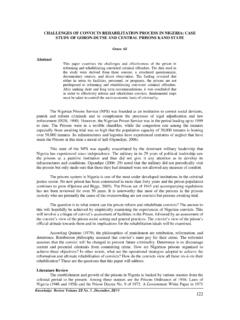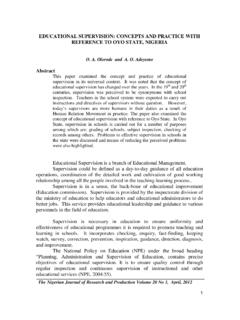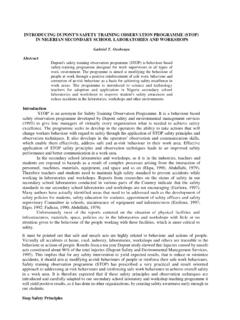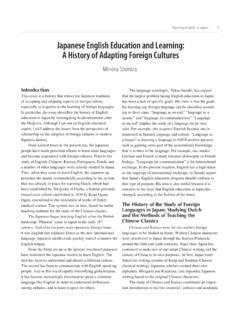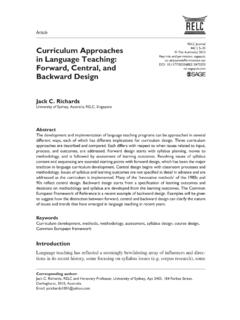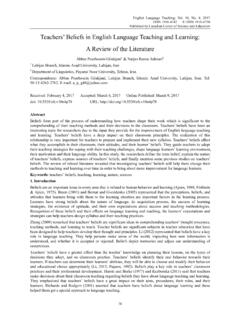Transcription of THE ROLE OF TEXTBOOKS IN EFFECTIVE TEACHING AND …
1 1 THE ROLE OF TEXTBOOKS IN EFFECTIVE TEACHING AND LEARNING OF english AS A SECOND language Geraldine I. Nnamdi-Eruchalu Abstract Speakers of english as mother tongue are exposed to their language from birth. They pick the items of their language right from their immediate surroundings and need neither any form of instruction nor a book containing the grammar of their language for them to have mastery of it. This is not so with the learner of the same language as a second language . The later aspires to learn it against the background of his native language . He needs official language instruction which is most often based on TEXTBOOKS . So, his encounter with the language is based on written texts. To this end, this paper is aimed at enunciating the roles of TEXTBOOKS in promoting the learning of english , their special features as well as the problems that are associated with the use of TEXTBOOKS in Nigerian Schools.
2 Learning in schools is synonymous with TEXTBOOKS . It is a manual which guides the teacher and the learner in the objectives of the subject. In the words of McArthur (1996: 951) a textbook is a book prescribed as part of a course of study . So, TEXTBOOKS are an integral part of TEACHING and learning in schools and contain instructions on particular subjects. Divorcing one from the other is like separating the dancer from the dance. Marland (1986: vi) observed that in most people s minds, books and schools go together and it is presumed that books are valuable for learning . A learner who enters the classroom to learn without text books should be likened to a farmer who goes to his farmland without a cutlass. When the learner owns a book, he will develop emotional attachment to it and this makes him want to study it often. Baldeh (1990: 63) went further to note that the textbook is an indispensable vademecum to any learner who wants to make a success of his education.
3 It is a necessary commodity in the TEACHING learning strategy . Meanwhile, it should not be over depended on because it is not a complete reservoir of the whole of the language . Teachers should always strive to provide supplementary reading materials whose major target is to provide motivation, variety, and enough practice to the learner. In recent times, TEXTBOOKS have been made accessible to learners through the internet. Some learners prefer reading these on-line TEXTBOOKS from their computer screens to reading from the hardcopy, but many still feel more comfortable reading through the pages of the printed textbook. The Need for Competence in english english is a world language as well as an international language used by the United Nations (UN), African Union (AU), European Union (EU), and many other organs providing international aids. It is the language of (North Atlantic Treaty Organization (NATO) command as well as the language of space science and aviation.)
4 It is also the language of world trade, science and technology, international music industry, the world media etc. In Nigeria, english performs a very vital role. Azikiwe (1998) observed that Nigerians learn the english language to: communicate with native and non native speakers; learn and understand the culture of the owners of the language ; be able to do business with people other than Nigerian nationals; be able to politically fit into the wide comity of nations; and impart or acquire a particular knowledge or skill for future life, education of the individual .(21) Nigeria is multilingual, multicultural, and multiethnic. It has over four hundred languages confined to ethnic boarders and this makes communication almost impossible beyond one s local environment. english is the language through which the tongues and tribes in Nigeria interact with Nigerian Journal of Curriculum and Instruction Volume 20 No 1, December, 2012.
5 2 one another and with people from other nations of the world in the areas of business, education, politics, science and technology, etc. Furthermore, language is culture. Once you understand a culture you have understood the people: the way they live and think. Knowledge of the english language enables Nigerians to understand the culture of the english people as well as those of other peoples of the world. It is the language of commerce and industry, administration, law, education, politics, sports and the media. In fact, it is used in virtually all areas of human life in Nigeria. Writing on the popularity of the language in Nigeria, Adekunle (1995) pointed out that: The english language acts mainly as the vehicle for that aspect of contemporary Nigerian culture which is now reflected in our history , educational system, administrative set up, our industrial and technological efforts, our political experiments, our international alignment preferences, our pattern of dressing, and to a large extent, in the attitude of Nigerian elite and most likely in the way these leaders of the Nigerian community structure reality.
6 Equally significant is the fact that quite a substantial body of the intellectual endeavour of Nigeria are carried out and recorded in the english language (64) Though many Nigerian linguists show negative attitude to the current prestige which the language enjoys in the country, it still remains the country s official language and is likely to remain so for a long time to come. To pass as an educated man in the country, one has to be proficient in the language . Proficiency in the language determines how successful one would be in all areas of human endeavour. english as a Second language (ESL) english is learnt and used as a second language in many countries of the world, especially those colonized by Britain and America. In such countries, the language occupies a position close to that of a native language since it is the language used in all spheres of life. It has a social, political, economic, commercial and educational role to play in them as well as in the individual lives of members of those societies.
7 Quoting Journal of english as a Second language (JESEL), Afolayan (1995) noted that: 1. ESL is usually the sequential second language of a multilingual person. 2. ESL may or may not be the sequential second language of a multilingual person. 3. ESL is a language in which a bi- or multilingual person conducts his every activities while sharing this role with another language in which the speaker has greater linguistic facility and intuitive knowledge. 4a. ESL is the language which has the sociocultural function of serving as an instrument of forcing bilingualism on its user country or community (usually an ex- colonial community in Africa, Asia or South America), and of turning such a community into a special second- language speech community of the language . b. It is the language which has the sociocultural function of serving another European country (such as Sweden) as a voluntarily chosen instrument for providing cultural enrichment and a wider window on the world, particularly in the field of politics, science, and technology.
8 5. The target of ESL for its TEACHING or learning within the formal educational system should ideally be World Standard english , modified by the local environment. 6. The target skills of ESL TEACHING within the formal educational system should include all four basic language skills of listening speaking, reading, and writing. Geraldine I. Nnamdi-Eruchalu 3 7. The academic components of ESL study should include all three academic areas: literature in english , english linguistics, and the practice of english use.(125-126) A language is a second language in a country when the citizens learn it after they have acquired their first language , but due to the inadequacy of the vernacular in communication beyond the local environment, they learn and use another language which in most cases is the language of the colonial masters. english is learnt as a second language in most of the countries colonized by Britain and America.
9 It was the language for the creation of such nations. In other words, it is the language of wider communication in politics, law, business, sports, education, social life, etc. in those countries. Consequently, it is learnt by many after they have become proficient in their first language . Since it is a major language used nationally in such countries, and it is the most widely used international language , there is a great need for proficiency in it. In other words, the four language skills- listening, speaking, reading, and writing should be taught effectively since ESL learners need to be proficient in all of them. Again, the learners should not be expected to approximate to the Received Pronunciation because their first language constantly interferes in their use of the english language . Their target variety should be internationally intelligible and must have some local fragrance. This is because the learners must be equipped with the skills they need to cope with everyday activities and situations which play a central part in their lives TEACHING and Learning of english in Nigerian Schools Much is expected of teachers of english at the secondary school since the crux of what learners learn on the language is taught here.
10 The learners, especially those whose parents or guardians are not educated, leave the primary school with a smattering knowledge of the english language mainly because they are taught by teachers who are more of educational generalists than specialists and who integrate the key elements of elementary english TEACHING (such as listening, speaking, reading, and writing) into the whole fabric of the child s experiences at (McArthur 1996: 938-939). Teachers of english at this level of education are not trained to teach the language . It is at the secondary level that students are exposed to the learning of english in the true sense of it since they are taught by language TEACHING specialists. So, there is a pressing need for the use of appropriate TEXTBOOKS which have contents that are rich enough to meet the demands of the students as well as the objectives of the curriculum.


